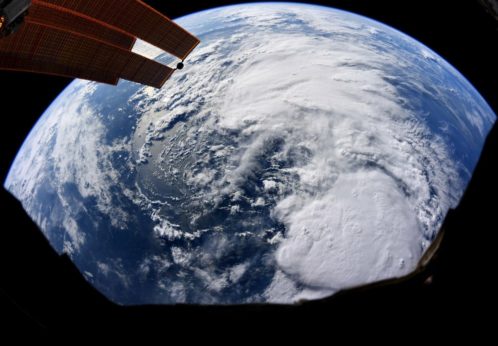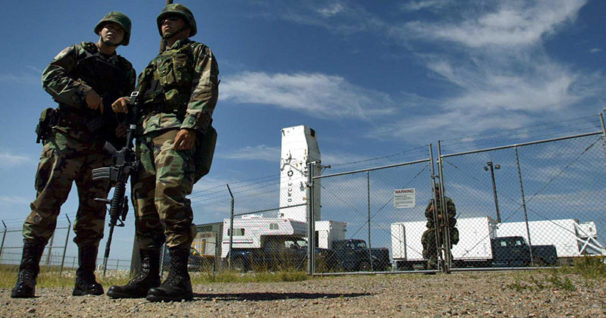
This is part 2 of the full main report, “Unity to save people and planet: For full equality, democracy, peace, and green socialism,” to the 31st National Convention of the Communist Party USA held in Chicago, June 21-23. Other installments available here. The abbreviated oral presentation is available here.
John Bachtell served as CPUSA national chair from 2014 to 2019. Rossana Cambron and Joe Sims were elected as the new CPUSA co-chairs at the convention.
Climate and ecological crises
“We stand now where two roads diverge. But unlike the roads in Robert Frost’s familiar poem, they are not equally fair. The road we have long been traveling is deceptively easy, a smooth superhighway on which we progress with great speed, but at its end lies disaster. The other fork of the road — the one less traveled by — offers our last, our only chance to reach a destination that assures the preservation of the earth.” – Rachel Carson
We are experiencing a planetary emergency and world ecological crisis without precedent. The very existence of humanity and nature is at stake.
The rapidly evolving climate crisis is interconnected with multiple other mega-ecological crises reaching tipping points. These include a biodiversity crisis and the mass extinction of plant and animal species. A new climate regime with extraordinary heatwaves. The warming and acidification of the oceans and sea-level rise. The appearance of enormous oceanic dead zones. Mega-droughts and flooding threaten most of the world’s agricultural and food production. Mega wildfires and deforestation. Evaporation of freshwater lakes and aquifers. Environmental toxins desertification, and ruination of soil. Waste streams, the ubiquitous spread of plastic waste, and microparticles. Disruption of atmospheric and oceanic currents.
We do not yet fully understand what will happen when crises reach tipping points and the impact of feedback loops. We do know these crises are disrupting and threatening the most essential elements of our lives—where we live, what we eat, what we drink. They are growing worse by the day and crowding out and intensifying every other issue.
Without a radical reduction in greenhouse gas emissions in the near term, our planet could become uninhabitable. Even if humanity transitions to a sustainable path tomorrow, the processes in motion and the damage done are likely to worsen and to last for generations. Society will have to adapt to a changing environment in unimaginable ways.

San Francisco, Miami, New York, Houston, New Orleans, and other coastal cities will be increasingly flooded. With a rise of 2 degrees Celsius by 2100, the land inhabited by 375 million people will be flooded, including Shanghai, Hong Kong, and Mumbai. Indonesia is moving its capital from the sinking city of Jakarta.
The climate and ecological crises more heavily impact the global South and developing countries, deepening social crises, conflicts, and mass migration. Hurricane Maria devasted the entire island of Puerto Rico, killed thousands, and forced tens of thousands more to emigrate to the U.S. mainland.
The severe drought in Guatemala is a huge factor, along with extreme poverty and gang violence, in forcing families, the majority of whom are indigenous peoples, to flee northward.
Everyone except the climate deniers knows the climate and ecological crises are driven by human activity. And not just any human activity, but that rooted in the capitalist production process, the exploitation of labor and nature, and the drive for maximum profits. The crisis has accelerated because of the sheer scope – and scale – of the exploitation and destruction of nature.
Marx foresaw this crisis over 150 years ago. He understood society is part of nature, and the capitalist system is inherently hostile to nature. Capitalism is unstable and requires an infinite consumption of resources in a finite world.
This crisis is driven by fossil fuel extractive industries, energy and military-industrial complexes, agri-business corporations, chemical and plastics industries, and finance capital. This is the same reactionary section of the capitalist class backing the extreme right, driving wealth inequality, threatening democratic rights and peace.
The entirety of human civilization must act on a timetable and scale that meets the crisis, one that adopts a zero-carbon and sustainable path of development, allocation of every human, scientific, productive, and natural resource necessary for the transition while also adapting to the effects of these crises.
This is why the Green New Deal, an overarching vision that meets the challenges posed by the climate crisis and extreme wealth inequality, is so exciting. While it is not a program for socialism, it is a radical economic, structural, and social reform. Its realization will shift the political balance and open a new stage in the fight for green, peaceful, democratic socialism.
More far-reaching steps are needed, including putting every natural resource and the energy complex under public authority, revolutionizing production to create zero waste, demilitarization of the economy, and enshrining the rights of nature in the constitution.
Nations cannot address these crises alone. Global cooperation that exceeds the Paris Climate Accords is needed among nations with different social systems, sections of capital, democratic and social movements, regional blocs, and global institutions.
The developed nations have a human and moral obligation to assist developing nations and emerging economies in adapting to a changing environment and transition to sustainability.
Militarism, growing nuclear danger, and war
“A nation that continues year after year to spend more money on military defense than on programs of social uplift is approaching spiritual death.” Dr. Martin Luther King, Jr.

Total U.S. military spending exceeds $1.25 trillion a year, nearly 70% of the federal budget. This enormous and growing waste is outrageous and unsustainable.
Humanity is being robbed of desperately needed resources that could provide every person with basic needs, fund the transition to a green economy, and adapt to the effects of the climate and ecological crises. Besides, the U.S. military is the world’s largest consumer of oil.
U.S. imperialism continues to deploy millions of troops, maintain 800 military bases around the world, and encircle Russia and China militarily. NATO continues to expand eastward and into South America.
The world is awash in weapons and yet less secure. U.S. military corporations account for 34% of the global arms trade. U.S. arms exports are 58% higher than those of Russia, the world’s second-largest exporter. And while U.S. arms exports grew by 25% in the four years from 2013 to 2017 compared with the period from 2008 to 2012, Russia’s exports fell by 7.1% over the same period.
The world is on the precipice of a new crisis in the Middle East and a war against Iran. A war, possibly a nuclear war, would be disastrous to the region and world.
Extremists in the Trump administration, U.S. imperialism, the military-industrial complex, oil corporations, and extreme right-wing regimes across the region are driving this danger. U.S. withdrawal from the Iran Nuclear Deal, the imposition of sanctions and the villainization of Iran, are provoking Iran to resume its nuclear program, providing the pretext for an attack.
The Middle East is the most unstable, chaotic, and heavily armed region in the world. Rivalries, reactionary regimes, and U.S. imperialism seeking control of oil resources dominate politics and economics. Middle East states accounted for almost half of U.S. arms exports from 2013 to 2017.
The Trump administration and weapons manufacturers are pouring gasoline on the fire with $8 billion in new arms sales to Saudi Arabia, the largest recipient of U.S. armaments. The reactionary Saudi monarchy has created the world’s most massive humanitarian crisis by carrying out a brutal war against the Houthis in Yemen.
According to media reports, underlying Trump’s agreement to transfer nuclear technology to Saudi Arabia is corruption connecting the Trump and Saudi royal families and 2016 election collusion.
The spread of nuclear weapons compounds the war danger. Nine countries possess nearly 14,000 nuclear weapons; the U.S. and Russia have 92% of them. The thought of Donald Trump’s finger on the nuclear trigger has alarmed the entire world.
Since their peak in the mid-1980s, global arsenals have shrunk by over three-fourths. More countries gave up weapons and programs in the past 30 years than developed them.
However, the U.S. is engaged in a $2 trillion nuclear modernization and development of a fifth military branch, a space force. Russia and China are undergoing similar modernizations. The world faces a new nuclear arms race.
New classes of nuclear weapons, small “low-yield” nukes and “hypersonic weapons” are being produced. The development of these “gateway nukes” make nuclear weapon use more likely.
Use of nuclear weapons is increasingly advocated, including by Trump and the military. The strategy of “escalate to de-escalate” is growing in acceptance.
A miscalculation, an accident, mistake, catastrophic terrorism or cyber warfare are the most likely catalysts of a nuclear use.
The CPUSA demands nuclear abolition, no first use, scrapping the nuclear modernization program, closure of the 800 foreign military bases, and dismantling of NATO. We demand the demilitarization of U.S. society and the use of the military budget to fund a transition to a green economy, universal health care, free education, and other social needs.
The transition to a peace economy will require a massive shift in public opinion. It will entail massive investments in new industries and services to fund the transition, including for cities and regions that depend on military bases and related industry. It will require a transition living wage and major environmental repair. U.S. military forces should be converted to a peaceful, environmental mobilization whose mission is to assist this transition to a peaceful, sustainable society.
The defeat of Trump, the GOP and extreme right in 2020 will be a blow to the oil corporations and the military-industrial complex. It will open new possibilities for achieving a peaceful foreign policy, for a demilitarized domestic economy and society, and for radically addressing the climate crisis.
Continued in part 3: Capitalist crisis of wealth extremes and economic disruption by robotics and artificial intelligence.










